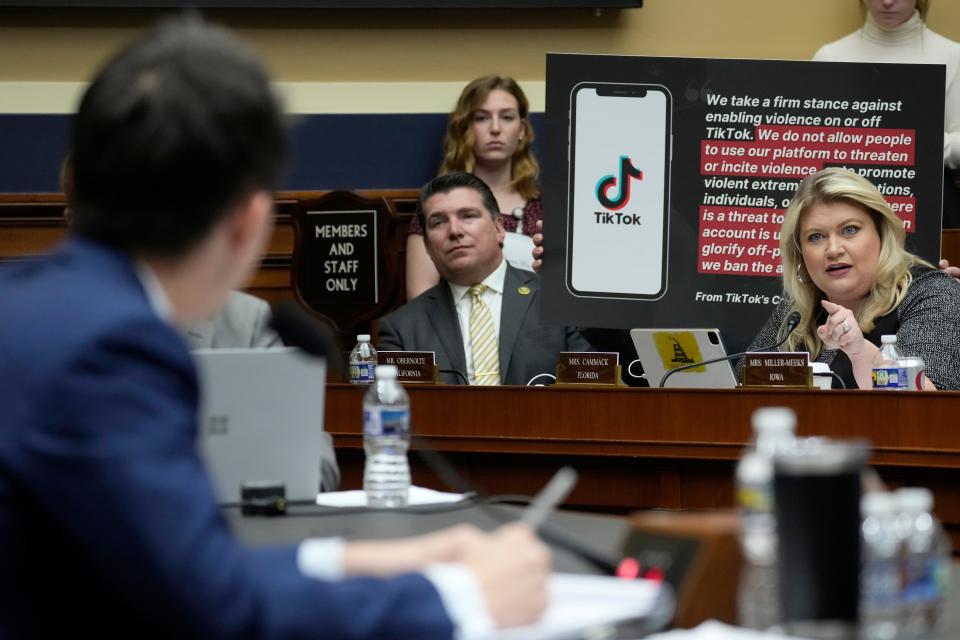Will TikTok be banned? Maybe it should be for kids, at least.
Congress wants to kick TikTok out of America. I want to boot it from my bedroom.
Like most crazy-busy parent professionals in America these days, I am beyond desperate for a full night of life-restoring rest. Yet I cannot fight the irresistible magnet-force pull that is the latest viral video – especially at night, when I’m too tired to be rational.
I’m not alone. TikTok’s been downloaded more than 210 million times in the United States, according to the most recent marketing statistics.
To date, there’s no evidence that TikTok is a threat to national security. But there’s plenty of evidence that, that like all of the others – Facebook, Twitter, Instagram, YouTube, Snapchat – the company’s main goal is to hook you young and keep you coming back for more.
Recently, I watched a friend's 10-year-old daughter sit under a tree, completely zoned-out on TikTok while ignoring her friends' calls to join them on the playground.
Earlier that same day, I watched an infant try to lock eyes with her mother as she nursed in that incredibly important bonding love-gaze, while the mom swiped through Instagram on her smartphone.
Tick-tock, TikTok: As Biden sets deadline for ban of social media app, here's what we know
Text message safety: Here’s how to catch anyone spying on your text messages
Always on YouTube?: Here are 6 tips, tricks and secrets to make your binging better
We should be mad at all social media platforms – not just TikTok. We should be furious over a lack of transparency, privacy protection, misinformation, but especially for the negative impacts on our kids. Then we should do something about it.
Why does the U.S. want to ban TikTok?
The concern centers on TikTok's parent company, ByteDance, and its Chinese ownership. Many U.S. politicians say that Chinese law could require ByteDance to hand over private user data, including potential intelligence or national security information.
Lawmakers also say the company could tweak it's video algorithm's to show Americans propaganda videos that push China's foreign policy goals or spread misinformation to skew a Presidential election. Some politicians say the only way to protect national security is to either ban TikTok or make ByteDance sell to an American company.

How many kids use social media?
According to Pew Research, two-thirds of teens in the U.S. use TikTok. It’s second only to YouTube when it comes to kids near-constant use, followed by Instagram and Snapchat.
In data compiled from 400,000 families for TechCrunch, parental software maker Qustodio shows that kids as young as four access these apps, even when companies put age restrictions (most are rated 12+) in place. The average person under the age of 18 uses TikTok for more than 90 minutes a day, and recently announced time limits are likely more to be “speed bumps” than actual deterrents.
Is social media unhealthy for kids?
Social media use can have some positive impacts, including helping to make online connections between youngsters who feel isolated offline. This is especially relevant for many marginalized identities, including racial, ethnic, sexual, and gender minorities, according to the American Psychological Association.
But a myriad of experts who study tech’s impact on young people say harmful practices are part of social media’s DNA. Platforms likely suck up as much personal data as possible for targeted marketing, data sharing, and a constant, unfettered, psychologically manipulative land grab for attention.
The damage it can inflict on children, tweens, and teens is especially alarming. It can disrupt homework, socialization, exercise, play, outdoor activity, brain development, and just about everything else medical experts and society in general agree grows healthy humans.
The National Institutes of Health (NIH) reports smartphones and social media can cause an “increase in mental distress, self-injurious behaviour and suicidality among youth,” and that “the effects appear to be greatest among girls.”
Is TikTok limiting screen time?
TikTok recently announced a new 60-minute “daily screen time limit” for everyone with a registered account who’s under the age of 18.
The app won’t kick you off at the hour mark though, rather “teens will be prompted to enter a passcode in order to continue watching, requiring them to make an active decision to extend that time,” writes Cormac Keenan, TikTok’s Head of Trust and Safety in a news release.
“For people in our under 13 experience, the daily screen time limit will also be set to 60 minutes, and a parent or guardian will need to set or enter an existing passcode to enable 30 minutes of additional watch time,” Keenan adds.
While many experts agree that being more intentional can help curb addictive behaviors, many teens say they just lie about their age when they sign up. It’s the same thing we’ve been hearing from young people for years about easy workarounds.

“We have a part of the brain called the executive function that’s responsible for self-regulation. For kids, it’s not fully mature, and yet they’re exposed to (social media) before their executive function mind (can help them manage it),” Gloria Mark, professor of Informatics at the University of California, Irvine and author of “Attention Span,” tells me over the phone. “A lot of adults have trouble with that as well,” she adds. (Case in point, me and the bedtime scrolling.) Mark spent 20 years studying the impact of digital media on people’s lives, especially as it affects multitasking, interruptions, and mood. One of her most notable findings is that “our attention spans are declining, averaging just 47 seconds on any screen,” which she says is down from 2.5 minutes less than 20 years ago.
What's a good parent to do?
Many parents I know feel confused, or at least outmatched, when it comes to managing social media and technology in general with their kids.
I’m just going to say it: There’s no good reason to just let a child from age 4 to 16 use social media with no restrictions or without any parental guidance or supervision.
Kids these days will grow up with technology, no matter what. They use online portals and digital classroom apps for school. They can use the internet to learn hobbies, connect with other children, and do all kinds of interesting and educational activities. Plus, their futures will likely be filled with more and more of it all.
It’s our job to give them the skills to manage it in a healthful way.
So what’s a good parent to do?
“That’s the question every parent in America is asking,” Bill Brady, Co-founder and CEO of Troomi Wireless, tells me over the phone. “You have to find that balance of how to give them what they need, without what they don’t.”
Should I keep my kids off social media?
Brady and his wife have five children, ages 19, 16, 13, 10, and 7. He developed Troomi, which consists of a basic Samsung smartphone loaded with Troomi’s custom-built “KidSmart OS,” to offer parents a way to remain connected with kids without the lure of social media or unfettered access to everything on the internet.
Parents use a “command center” type companion app to ease into upgraded functionality as their children learn, mature, and become able to regulate themselves.
Brady says his two youngest children don’t have devices of their own. His 13-year-old daughter has a Troomi phone, and the two oldest graduated to iPhones around the age of 16. Social media is off limits until they turn 18, he said.
“We talk about it openly and honestly, and they demonstrate the learning and gradual adoption of technology while taking a larger role in governing themselves,” Brady says.
My daughter, who’s about to turn 22, wasn’t allowed to have social media apps on her devices until about halfway through high school, and we limited it to 30 minutes a day and only when all her homework was done.
How do I limit my child's social media?
There’s growing pressure from advocacy groups, judiciary committees, and even from President Biden himself for social media companies to become more accountable for all of these issues.
“There should be more regulation, especially on the content, algorithms, and targeted advertising directed toward kids,” says Mark. “There should also be an easier way to create friction so the apps aren’t so easily accessible.”
We can start our kids with training-wheel tech like Troomi, Gabb, Bark, and others. Check out sites dedicated to this research, education, and ongoing discussions, such as the LogOff Movement, Social Awakening, or the Child Mind Institute.
We should not only set boundaries for our children but also model better habits ourselves, this includes no more night-scrolling myself. And I’ve been that mom whose child tries to get my attention away from my screen only to tell her to hang on for one more minute while I finish a post or text or email that just ‘could not wait.’
“One of the biggest things parents can do is limit screen time and be better role models themselves,” Mark said. “Get off screens and pay attention to your child so that they don’t learn that it’s normal to have a phone between you and another person,”
And let’s keep talking to each other about it, too. Be sure to share your thoughts in the comments section of our – yes, this is ironic – social media pages as well.
Jennifer Jolly is an Emmy Award-winning consumer tech columnist. The views and opinions expressed in this column are the author's and do not necessarily reflect those of USA TODAY.
This article originally appeared on USA TODAY: TikTok ban: Social media apps still dangerous for kids

